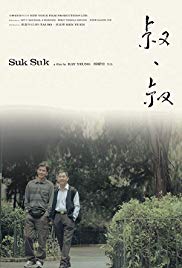
SUK SUK
Kong, 2019, 92 minutes, Colour.
Tai-Bo?, Ben Yuen.
Directed by Rey Seung.
Suk Suk is an elderly man meticulously washing and cleaning his car. He is a taxi driver in Hong Kong. He is 70, married with son and daughter, appreciating but often off-hand with his wife, delighting in his granddaughter. But, there is much more to his character and personality.
This is a Hong Kong story about gay men who had to conceal their orientation for many decades, marry, have families, survive and give the impression of ordinariness in their lives.
The audience may be surprised to discover the taxi driver’s real life, so well is it initially concealed in the film. But he sees an older man in the park, cruises the park, tries to ingratiate himself – but the other man, who we discover has also married and concealed his orientation, wants friendship before sexual encounters.
The main story then is of the relationship between these two men, their talking about their past and its effect on them, their visits to gay saunas, the beginning of friendship and sexual companionship. In the background are the complications of the next generation, the taxi driver’s daughter getting married, her fiance not being able to afford the wedding banquet (to the disgust of his mother in law), the father not only paying for the celebration but also giving him the lease of the taxi. The other man’s son is rather prim and proper, demandingly politically correct for himself, his wife and daughter, with a Christian background, shared by his father.
And the point for telling this story, politically and socially, is a movement to establish a home for the elderly, full gay elderly men, run by gay staff who respect the men who are able to emerge from their secrecy. We see several meetings and panels with political pleas for establishing the homes.
A sympathetic story of gay men, memories of social treatment in the past, secrecy and cover, the emergence of recognition and acknowledgement in more recent times.
1. Hong Kong story? Characters? Families? Gay issues?
2. The background of the city, the streets, the harbour, homes, clubs? The musical score and the plaintiff background?
3. The introduction to Pak, cleaning his taxi meticulously, picking up his granddaughter, going home, the taken-for-granted relationship with his wife, his son and family, his daughter and fiance? His age, issues of retiring?
4. The introduction of the homosexuality theme? Pak and his cruising, Hoi in the park, wanting to be a friend first? The impact for the audience, the gay man who had married and had a family, a comfortable life at home, work, carrying rice, driving the taxi? Secretiveness?
5. The friend, his background story, unsatisfactory marriage, his meticulous son, protecting his daughter, “politically correct�? Criticisms of his father? The Christian background?
6. The two men, friendship, taxi rides, texting, going to the baths? Their memories of the past? The growing intimacy between them? Covering from their families?
7. The daughter, the fiance, not having enough money for the wedding breakfast, the mother and her criticisms, the father and his encouragement, the celebration? The father giving him the lease, taxi?
8. The companionship between the two men? Their talking and remembering?
9. The old gay men, the issue of the home for gay men, staff, enabling them to be themselves? The group meeting, the discussions, the stories from the past? The final issue of the plea for the home? On the television?
10. A sympathetic plea for the men? Impact for Hong Kong? Beyond Hong Kong?